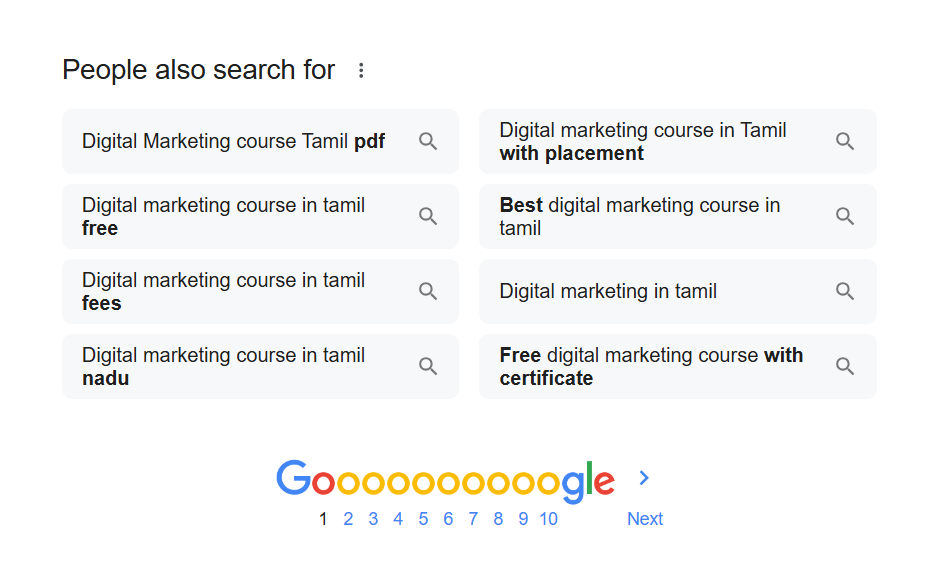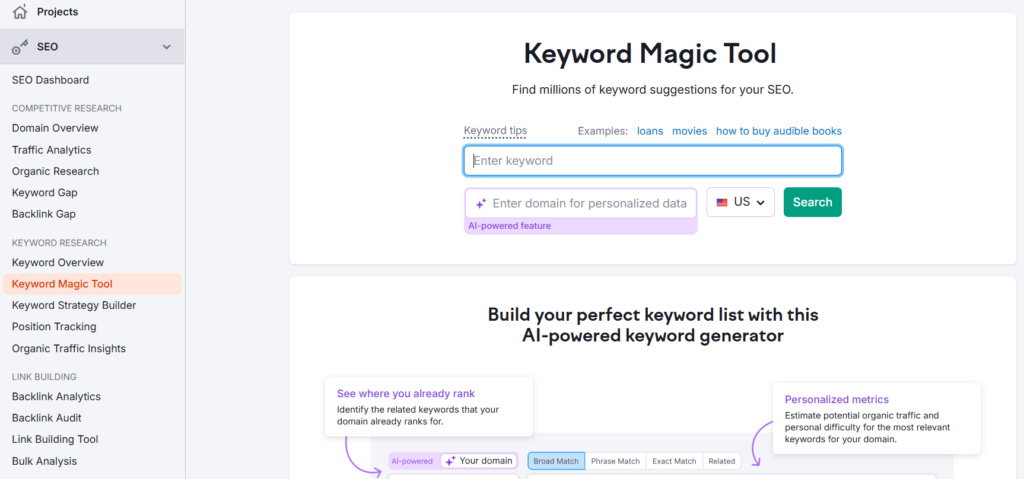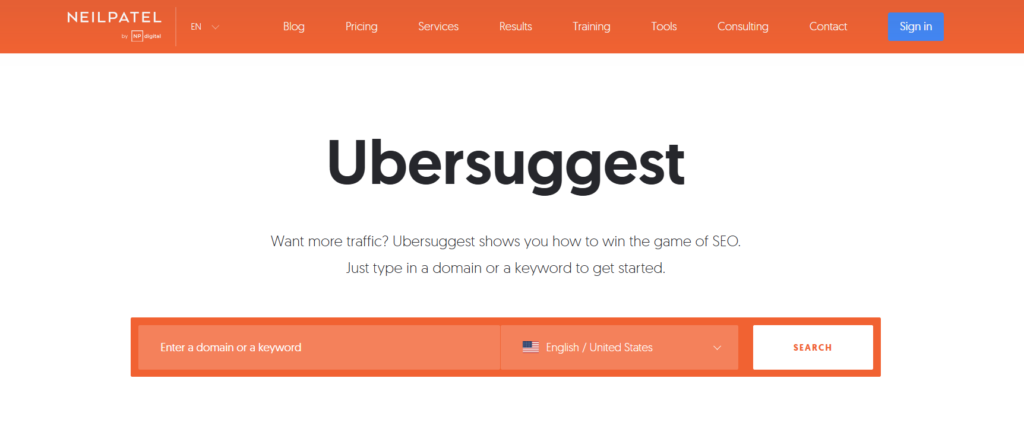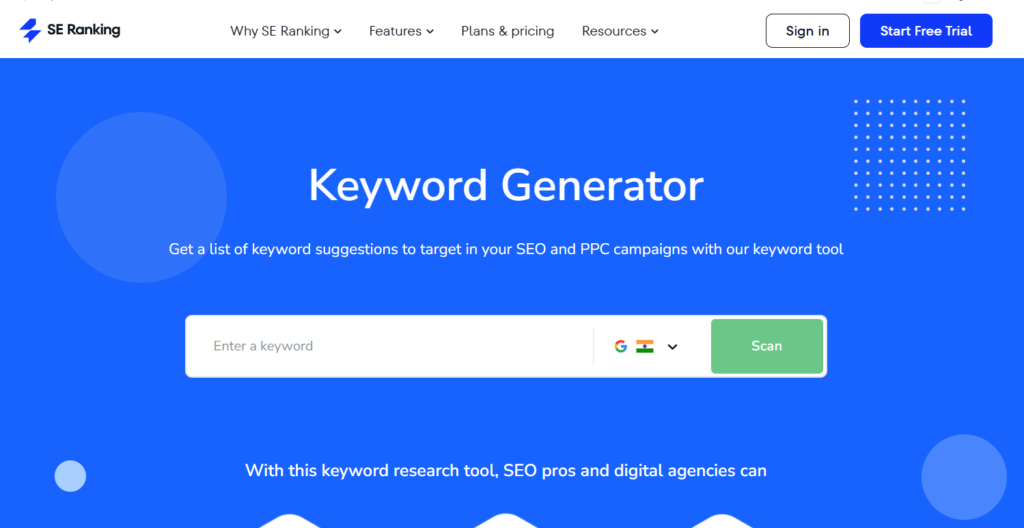How to Do Keyword Research for SEO | A Complete Guide
Nevin Balamurugan
March 17, 2025

Keyword Research for SEO | A Complete Beginner’s Guide
Keyword research for SEO is always a hot topic in marketing circles to direct customers to your websites.
Did you know that Google drives a whopping 17% of website traffic through organic search? All your hard work and all your effort work to get relevant audience to find your content.
Without keyword research, you won’t know which keywords your target audience is searching for, which keywords have search intent that matches your business, which keywords are feasible for you to target over your competitors, and what you need to do to rank for them.
But picking the right ones matters in keyword research. Picking the wrong ones can decrease your chances of customers finding your content.
To avoid this, we’ll define what keyword research for SEO is, why it is important, and how to conduct keyword research step-by-step to find, analyze, and implement the right keywords so you can make sure it’s worth your time trying to rank your content.

What is Keyword Research for SEO?
Keyword is a key to attract organic traffic to your website, and it helps to understand how people search – what questions they ask and what information they want. You need that original search term to attract them.
You can do this with the help of keyword research.
Keyword research for SEO is the process of figuring out the terms people type into search engines to find information they want. It helps you identify which terms are popular, which terms work best, which ones your site can target to rank better, and the type of content Google thinks searchers are looking for.
You can carry out keyword research for SEO locally, nationally, and globally.
- Local keywords: These keywords help you target audiences who are searching for products or services in their immediate area (city, neighborhood, or region). For example, you could use keywords like “best coffee shop in Los Angeles.”
- National keywords: These keywords are relevant to targeting a broader audience across an entire country. For example, they might include “best online grocery store in India.”
- Global Keywords: These keywords help you target a global audience and cater to international markets, which can help you rank higher. For example, you could use keywords like “best digital marketing agency.”
This means you can do keyword research for SEO even if you are a small business that only serves customers in a particular city or state or a larger company that serves customers worldwide.
Why is Keyword Research for SEO Important?

Keyword research is important for SEO because it tells what your audience is looking for, and applying those search terms helps you rank higher in search engine results pages (SERPs). Businesses that run online can thrive; without an online presence, your success is hard to reach.
Google processes over 8.5 billion search queries every day, which says 99,000 search terms every second. So, you have a lot of keywords available, you just need to research and refine which keywords work for your business.
There’s no point in creating content if people aren’t searching for it. Keyword research helps you avoid this scenario and guarantees you target the search terms your target audience uses. This makes your customers find your website on Google and visit you.
You have a list of high-volume search terms, but keyword research helps you find the ones your website can realistically rank.
This is how your website appears for search results.

Image credits: Google
How Does Search Intent Play an Important Role in Keyword Research?
Keyword research for SEO is vital before optimizing your website based on search intent.
Search intent is the reason behind a customer’s query—what they’re looking to find or accomplish. Google works to deliver results that match the intent behind each search.
For example, if someone’s searching for basketball shoes, they’ll get links to e-commerce sites, while someone searching for information might find blog or video content.
There are four types of search intent:
- Informational Intent: Customers are looking for information or answers to a question. For example: “how to bake a cake”.
- Navigational Intent: Customers are trying to find a specific page or website. For example: “Instagram login”.
- Transactional Intent: Customers are about to make a purchase. For example: “shoes for jogging”.
- Commercial Intent: Customers are about to make a purchase but need information before making a purchase. For example: “best smartphones under 50000”.
By doing keyword research, you can identify the search intent behind your target keywords so you can create better content according to search intent to rank well.
How to do Keyword Research for SEO?
So, you know what keyword research for SEO is and why keyword research and search intent are important in SEO. Now, you will learn how to research keywords for SEO,
- Discover a list of relevant topics based on what you know about your business
- Fill out your topic list with relevant keywords
- Understand how search intent affects keyword research and analyze it accordingly
- Your keyword research needs to be related to search terms
- Use keyword research tools to find better ranking keywords
This keyword research process helps you come up with a list of search terms you should be targeting for your business. That way, you’ll be able to execute strong keywords that align with the search terms you care about.
STEP 1: Discover a list of relevant topics based on what you know about your business
Before you do keyword research for SEO, take a minute and visit your website to find business goals.
Think about the topics you want to rank for to lead customers to your website. You’ll come up with ideas that are essential to your business, and then you’ll use those ideas to help come up with some specific keywords later in the process.
Put yourself in the shoes of your buyer personas.
What types of topics would your target audience search for?
This allows you to gauge how important your ideas are for your audience and how many different subtopics you need to create to work successfully with that particular keyword.
STEP 2: Fill out your topic list with relevant keywords
Now that you have a few topic lists you want to focus on, it’s time to identify some keywords that fall into these lists.
Keyword phrases are important to rank for in the SERPs (search engine results pages) because your target customer is probably conducting searches for those specific terms.
For instance, if you’re digital marketing institute offers digital marketing courses for Tamil-based students, your keyword might be “digital marketing course in Tamil” — we’d brainstorm some keyword phrases people would type in related to this topic.
digital marketing course tamil
how to learn digital marketing in tamil
digital marketing course tamil online
digital marketing tamil course
best digital marketing course in Tamil
how to choose the best digital marketing course in Tamil
The point of this step isn’t to come up with your final list of keyword phrases; you just want a brain dump of phrases you think potential customers might use to search for content related to that particular topic list.
Remember, Google processes more keywords every day, so a smart way to generate keyword ideas is to determine which keywords already bring customers to your website.
To do this, you’ll need website analytics software like Google Analytics or Google Search Console, which analyze your website traffic.
STEP 3: Understand how search intent affects keyword research and analyze it accordingly
Customer’s search intent is one of the most pivotal factors to rank well on search engines. This means it’s vital that your web page addresses the problem a searcher wants to solve rather than simply including the keyword the searcher used.
So, how does this affect your keyword research?
A customer’s search intent has different meanings because the intent behind a search is important to your ranking potential, you need to be extra careful about how you interpret the keywords you target.
Let’s say your customer is researching the keyword “how to learn digital marketing course in Tamil”. “Digital marketing course in Tamil” can mean a digital marketing course website or an information article, and the searcher’s intent behind that keyword will influence the direction of your article.
Does the searcher want to learn how to choose the best digital marketing course in Tamil? Or do they want to know how to acquire knowledge about digital marketing skills from a digital marketing course in Tamil?
If your content strategy only targets people interested in the latter, you’ll need to determine the keyword’s intent before using it. To verify a customer’s intent, it’s a good idea to enter your particular keyword into a search engine and see what types of results come up.
STEP 4: Your keyword research needs to be related to search terms
This is a smart step to do keyword research for SEO to find the right search intent of what you’re customers are looking at. If you’re struggling to think of more keywords that people might be searching for on a specific topic, take a look at the related search terms that appear when you plug a keyword into Google.
While searching for “Digital marketing course in Tamil,” at the bottom of the first page, you can see that customers are also specifically searching for these terms,

Image credits: Google
These keywords can spark ideas for other keywords you may want to take into consideration related to your business.
STEP 5: Use keyword research tools to find better ranking keywords
Keyword research for SEO tools can help you brainstorm keyword ideas based on exact-match, broad-match, or phrase-match keywords based on the ideas you’ve generated up to this point.
We have given some of the popular ones to do keyword research.
1. Ahrefs Free Keyword Generator
This is one of the best keyword research tools, you can use this tool free to research keywords related to your website content.

Image credits: Ahrefs
2. SEMrush Keyword Magic Tool
Semrush wasn’t surprising to find keywords on a comprehensive level.
To do keyword research, you need to set up an account, it’s free. Then, you can type in your keyword with location, you will get a list of similar keywords, and sort it out based on your specific needs.

Image credits: Semrush
3. Ubersuggest
You can get up to three free searches a day.

Image credits: Ubersuggest
In addition to finding out specific keyword performance, you can find related keywords and do a quick reverse search to find out what your site is already ranking for. It’s one of the easiest and gives you comprehensive free options if you don’t mind the limitations of the searches.
4. SE Ranking
SE Ranking is user-friendly, you can set up a free seven-day trial without creating an account.

Image credits: SE ranking
By doing keyword research for SEO, you can get your result data with lots of great ideas.
5. Google Ads Keyword Planner
Google Ads’ tools are always gold. Once you sign in with your Google account, you can search for keyword ideas based on the keyword or your website. It’s free everyone, whether you create Google Ads or not.

Image credits: Google Ads
You’re Ready to Drive Traffic to Your Website Through Keyword Research for SEO
Keyword research for SEO is not just confined to keyword research tools. You can find keywords everywhere—if you know where to look (search intent).
If you would love to rank your page higher to get organic traffic, reach out to NB Marketing Solutions today. We help our clients’ website pages reach their target audience through organic traffic.
Or if you enrich your search engine optimization skills, enroll in our digital marketing course in Tamil today.
Recent Posts
Have Any Question?
- (+91) 938-542-1049
- info@nbmarketingsolutions.in
Categories
Make Appointment
Confused Over Choosing The Right Services For Your Business?
Tamil Nadu, India
- Near TMB Bank, Anjugramam post, Kanyakumari 629401
- info@nbmarketingsolutions.in
- (+91)93-8542-1049
